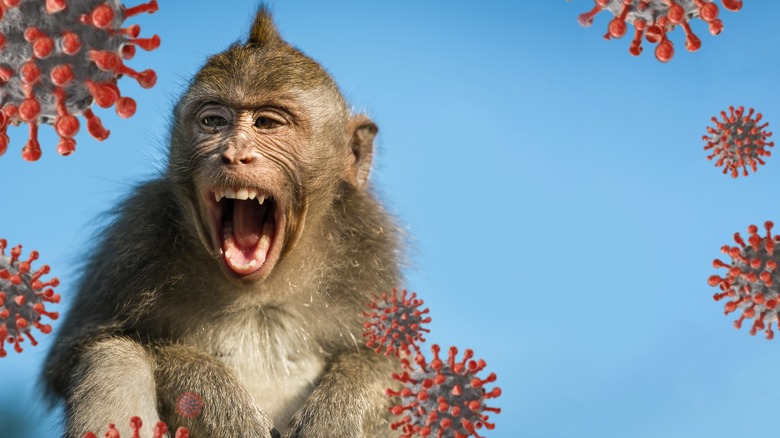What You Should Know About An HIV-Similar Virus Recently Found In Monkeys
Currently we know that it's possible for viruses to spread from animals to humans. Take monkeypox for example; this viral zoonotic disease is caused by the monkeypox virus and was originally transmitted from animals to humans in west and central Africa, points out the World Health Organization. What's more, as the monkeypox virus has been spreading across the globe, researchers wonder about this potential in other viruses. As it turns out, a new pathogen has been found in African macaque monkeys and scientists are investigating whether or not it could jump to humans, shares U.S. News & World Report.
Researchers suggest this animal virus has traits in common with the human immunodeficiency virus, or HIV, which was originally transmitted from African monkeys to humans. However, no human cases have been reported with the new virus. In a proactive stance, researchers from the study are asking for the global health community to keep studying these arteriviruses in both humans and animals, and to create blood antibody tests for them in order to reduce the risk of an outbreak or pandemic (via University of Colorado Boulder).
What else did the researchers find?
It's important to note that researchers suggest there is no imminent threat, but they say it may be something to keep an eye on. "Just because we haven't diagnosed a human arterivirus infection yet doesn't mean that no human has been exposed," explains study author Cody Warren, an assistant professor at the Ohio State University College of Veterinary Medicine (per University of Colorado Boulder). While arteriviruses are often studied in pigs and horses, they're not often examined in non-human primates (aka monkeys).
The researchers took a closer look at arteriviruses in monkeys, specifically the simian hemorrhagic fever virus (SHFV), points out the study. This is a rare type of virus that shares commonalities with other hemorrhagic fever-causing viruses such as Ebola. What the researchers found was that a receptor called CD163 plays a big part in the biology of simian arteriviruses, helping the viruses invade and infect cells, explains University of Colorado Boulder. But they also discovered this virus could enter human cells and quickly replicate because it has the ability to latch onto the human version of CD163, potentially impairing the immune system in a similar manner to HIV and simian immunodeficiency virus (SIV), shares U.S. News & World Report. The researchers explain that raising awareness is a strategic, cautious approach for managing viruses such as these to ensure public health safety.


